The Wolves of Midwinter Read online
Page 36
Laughter and lively conversation had returned to Nideck Point. And the pounding storm only made the whole party all the more convivial and stimulating. Conversation rolled easily round the table, often sweeping up the entire group, and other times breaking naturally into pockets of animated voices and eager faces.
“But what do the Forest Gentry do on a night like this?” asked Phil. They could hear the shifting and groaning of the old oaks. Far off somewhere in the darkness there came a violent cracking sound as of a branch broken from a trunk.
“Ah, well, I invited them to the feast,” said Margon, “at least Elthram and Mara and whomever they might want to bring, but they told me in the gentlest terms that they had other centennials to attend in the far north, so I would suppose they are not here. But insofar as they have no real bodies, and exist as elements in the air, I can’t imagine that a storm does anything more than excite them.”
“But they’ll be coming back, won’t they?” asked Stuart.
“Oh, most certainly,” said Felix. “But when only they know, and never believe that the woods are without spirits. There are others out there, others we don’t know by name and who do not know us by name, but they might manifest if ever they feel the need to do it.”
“Are they guarding this house?” asked Laura in a small voice.
“Yes, they are,” said Felix. “They are guarding it. And no one under this roof should ever feel the slightest fear of them. As for anyone who tries to hurt this house …”
“But this is not the night to talk of such threats or such worries or such routine and petty annoyances,” said Margon. “Come, let’s drink again. Let’s drink to each and every one of this rare and priceless company.”
And so it went on, toast after toast, as the fowl and the meat were devoured, and at last the table was cleared by all hands as naturally as it had always been done here, and the fresh fruits and the cheeses were laid out with the more egregious and stunning chocolate desserts and German pastries.
It was eleven thirty before Felix rose to his feet again, and this time the gathering was subdued and perhaps ready for his more sober reflections. The music had long ago been turned off. Fresh logs had been thrown on the fire. All were comfortably settled with their coffee or brandy. And Felix’s face was philosophical but the familiar smile played at the edges of his mouth as it always did when he was in a good humor.
“And so another year dies,” he said, looking off, “and we have lost Marrok, and Fiona, and Helena.”
Clearly he was not finished, but Margon spoke up quietly.
“I wouldn’t for all the goodwill in the world,” he said, “speak the names tonight of those who brought death to our Modranicht. But I will speak their names for you, Felix, if that is what you require, and for anyone else here who wants to mourn for them.”
Felix’s smile was sad but thoughtful.
“Well, for the last time,” said Margon, “let us say their names, and pray that they have gone to a place of rest and understanding.”
“Hear, hear,” said Thibault and Sergei right after him. “And you forgive us for this, Philip, please,” said Frank.
“Forgive you?” asked Phil. “What is there to forgive?” He lifted his glass. “To the mothers of my Modranicht and the life I have now inside me. I bear you no ill will and won’t insult you with my thanks for this new chapter in my story.”
There was a quick soft round of applause.
Phil drank.
“And to this coming year and all its blessings,” said Felix. “To Reuben’s son, and to all the bright futures of those gathered here. To fate and fortune, that they be kind, and to our hearts that they not forget the lessons learned from all we’ve witnessed in this Yuletide, our first Yuletide, with our new kindred.”
Sergei gave the usual roar, and swung the bottle of brandy over his head, and Frank beat on the table and declared that solemnity had worn out its welcome.
“The clock’s ticking towards midnight,” said Frank, “and another year is dying whether we are any older or not, and the same damned challenges as always lie before us.”
“Well, that’s pretty damned solemn,” said Berenice with a soft laugh. In fact, laughter was breaking out spontaneously on all sides for no apparent reason except the comfortable and drunken spirits of the group.
“So many thoughts are running through my mind,” said Felix, “as to what this new year holds for us.”
“Too much thinking!” cried Sergei. “Drink, don’t think!”
“Ah, but seriously,” Felix pressed on. “One thing that we must do in the next year is share the stories of our lives with our new brothers and sister.”
“Now, I’ll drink to that,” said Stuart. “The truth and nothing but the whole truth.”
“Who said anything about the truth?” asked Berenice.
“As long as I don’t have to hear one single word of it tonight,” said Sergei. “And you young ones just wait until the Geliebten Lakaien start weaving their tales of origins and histories.”
“What do you mean? What are you saying?” Stuart said. “I wanna know the truth, damn it, about everything.”
“I’m game to hear all of it,” said Reuben. Phil nodded to that and raised his glass.
The laughter was rolling back and forth as if it were speech.
And Felix had all but given up on bringing any final serious note to the evening, settling for toasts and teasing Stuart and fending off Margon’s light jabs.
Reuben drank his coffee, loving the sharpness of the taste and the jolt of the caffeine, and pushed his wineglass away from him. He gazed lovingly and sentimentally at Laura, her blue eyes so vivid with her blue dress, and the emotions welled dangerously inside him. Seven minutes to go, he thought, his watch right in time with the grandfather clock in the main room, and then you take her in your arms and crush her with all your might and main as she crushes you, and you never forget this night, this Yuletide, this Modranicht, this year, this season in which your new life was born, and your deepest loves and understandings with it.
Suddenly a loud booming sounded from the front door.
And for a moment no one moved. Again came the sound, someone out there in the downpour, pounding on the front door.
“But who in the wide world!” declared Frank. He rose like the sentry on duty and marched across the dining room and into the main room.
A fierce draft swept through the house as the door was opened, lifting the fragile flames from the candles, and then came the crack of the door being slammed hard and bolted once more, and the sounds of two voices in argument.
Felix stood quietly at the head of the table, glass in hand, listening as if he had a presentiment or realization of who it was that had come knocking. The others were listening, trying to catch the identity of the new voice, and Berenice gave a soft little sound of misery.
Frank appeared, flushed and annoyed.
“You want him in this house?”
Felix didn’t immediately respond. He was looking past Frank into the alcove between the dining room and the living room.
And then as Frank moved away and returned to his chair, Felix beckoned to the newcomer.
A soaked and bedraggled Hockan appeared, his face and hands white and trembling.
“Good Lord, you’re drenched,” said Felix. “Lisa, one of my sweaters upstairs. Heddy, towels.”
The rest of the company sat silent around the table, and Reuben found himself watching in fascination.
“Come, take off this coat,” said Felix, unbuttoning the coat himself and slipping it from Hockan’s shoulders.
Heddy came behind him, blotting at Hockan’s wet hair, and then offering him the towel to wipe his face, but he just stared at the towel as if he didn’t know the significance of it.
“Step out of your wet shoes, master,” she said.
Hockan stood there in a daze.
He stood before Felix looking into Felix’s eyes, his face quivering and unreadable.<
br />
A small sound came out of him, something like a strangled word or a groan, and quite suddenly, Hockan broke down, his hand up to cover his eyes as his body shook with dry sobs.
“They’re gone, they’re all gone!” he said in a deep agonized voice, sobs erupting like coughs. “They’re gone, Helena and Fiona, and all the others.”
“Oh, come,” said Felix gently. He put his arms around Hockan and brought him to the table. “I know,” he said. “But you have us. You will always have us. We’re here for you.”
Hockan clung to Felix, weeping on his shoulder.
Margon rolled his eyes, and Thibault shook his head. Out of Sergei there came the inevitable deep growl of disapproval.
And Frank said in a hard low voice, “My God, Felix, you are past all patience, my friend.”
“Felix,” said Sergei ominously. “Is there no person under the sun—fairy, elf, demon, troll, or perfect scoundrel—whom you will not try to love and live at peace with!”
Thibault uttered a short bitter laugh.
But Hockan seemed to hear none of this. His soft helpless choking sobs continued.
Felix held him in a gentle embrace but he still managed to turn his head and look at the others.
“Yuletide, gentlemen,” said Felix, his eyes glazed. “Yuletide,” he said again. “And he’s our brother.”
No one answered. Reuben stole a glance at Phil, whose face was almost heartbreakingly sad as he gazed down the table at the two men. But there was a serene and wondering quality to his expression, too.
Hockan seemed as shattered as a man can be, his soul emptying in his private sobs, utterly oblivious to everyone and everything except Felix. “I don’t know where to go,” came Hockan’s muffled voice. “I don’t know what to do.”
“Yuletide,” said Margon finally. He stood up and placed his right hand on Hockan’s shoulder. “All right, brother. You’re with us now.”
Lisa had returned with the sweater over her arm, but it was not the time for it. And she waited in the shadows.
The muted, helpless weeping poured from Hockan.
“Yuletide,” said Berenice. The tears were sliding down her cheeks.
“Yuletide,” said Frank with an exasperated sigh and lifted his glass.
“Yuletide,” said Sergei.
And the same word came now from Laura and Phil and from Lisa and the other Geliebten Lakaien.
Laura had tears in her eyes, and Berenice continued to cry, nodding as she looked gratefully to the others.
Reuben rose to his feet. He stood beside Felix.
“Thank you,” said Felix in a small confidential whisper.
“Midnight,” said Reuben. “The clock’s chiming.” And he put his arms around Felix and Hockan together before he turned to embrace his beloved Laura.
27
GRACE CALLED ON SUNDAY, January 6. Reuben was hard at work on an essay for Billie, this one on the tiny town of Nideck and its ongoing renaissance with new businesses and new home construction.
“Your brother needs you,” Grace said. “And he needs his father, too, if you can get the old man to come down here with you.”
“What’s happened? What do you mean?”
“Reuben, it’s his parish. It’s that neighborhood. It’s the Tenderloin. A couple of thugs attacked a young priest who was visiting Jim yesterday afternoon. Reuben, they beat the hell out of him, and castrated him. He died on the operating table last night, and maybe it was a blessing, I honestly don’t know. But your brother’s out of his mind.”
Reuben was aghast. “I can see why. Look, we’re coming. I’ll be there as quickly as I can.”
“Jim called the police, and they came here to the hospital. Jim knows who’s behind this, some drug dealer, some contemptible piece of filth! But they said there was nothing they could do without the dead priest’s testimony. Some other witness had been murdered too. I couldn’t understand what they were talking about. Reuben, Jim just about went crazy when the priest died. And Jim’s been missing since last night.”
“What do you mean, Jim’s missing?” Reuben asked. He was on his feet, pulling his suitcase off the top shelf of the closet.
“Just what I said. I begged him to come home, to stay at home, to clear out of that apartment and come back home. But your brother just doesn’t listen to me. Now he’s not answering his phone and the parish office doesn’t know where he is either. He didn’t say Mass this morning, Reuben, can you imagine? They called me.
“Reuben, persuade Phil to come down here. Jim listens to your father. Jim listens to you. But Jim simply never listens to me.”
Reuben was throwing things into the suitcase. “I’ll find him. He’s out of his mind over this, and we’ll be there as soon as we can.”
Phil was in the oak forest when Reuben found him, walking and talking with Hockan Crost. Hockan excused himself to give them privacy and Phil heard the story before he said a word.
“How can I go down there, Reuben?” he asked. “Look, the change came over me last night. Oh, don’t worry about it. I was with Lisa and she called Margon immediately. It was past midnight. Wow. Have I got a story to tell you—.”
“Then you can’t go,” said Reuben.
“Exactly. The change will come again tonight and nobody knows at what time. But that’s just part of the problem, and you know it. Look at me, son. What do you see?”
Phil was right. His hair was fuller, thicker, and the strawberry blond streaks in it were most lustrous and prominent and he had the physique of a man in his prime. His face still bore the stamp of his age, but his eyes, his expression, his movements—all had been beautifully altered, and Jim would see this at once. Grace would see it at once.
“You’re right,” said Reuben. “Jim’s crazed, obviously, and seeing you like this, well—.”
“Might just drive him right out of his mind,” said Phil. “You’ve got to go in without me. Try to get him to move back home. Or get him someplace decent, Reuben, where he can recover from all this. A nice hotel suite. Jim hasn’t taken a vacation in five years, and now this.”
After a quick call to Laura, who was in the town of Nideck working with Felix and several of the new merchants—and three unanswered calls to Jim’s cell—Reuben was on the road by noon.
He was almost to Marin County before he heard from Grace again.
“I’ve reported him missing,” said Grace, “but the police won’t do anything about it. It hasn’t been twenty-four hours yet. Reuben, I have never seen Jim like he was. You should have seen him when we told him this priest was dead. I mean he was silently coming unglued. He just walked out of the hospital without speaking to anyone and disappeared. Reuben, we’ve found his car is in the parking lot. He’s on foot.”
“Mom, he might have taken a cab somewhere. I’ll find him. I’ll be there in an hour and a half.”
He pulled off the road long enough to call Jim’s rectory, with no success, to ring the apartment where he got no answer, and to leave another message on Jim’s cell. “I’m practically to the Golden Gate Bridge. Please, please call me as soon as you can.”
He was in San Francisco, on his way up Lombard Street, not certain whether to go home first or to the hospital, when a text from Jim appeared in his phone.
“Huntington Park, Nob Hill. Tell no one.”
“Minutes away,” Reuben texted and immediately turned right. This was not the worst place to be meeting his brother by any means. There were three hotels on top of Nob Hill right on the park.
It was raining lightly but the traffic wasn’t bad. He reached the summit of the hill in five minutes and pulled at once into the Taylor Street public parking garage. Grabbing his suitcase, he sprinted across Taylor and into the park.
Jim was sitting alone on a bench with a briefcase on his lap. He was in full Roman collar and black clerics, and staring ahead of him as if he was in a trance. A light rain gave a sheen to the pathways and had speckled Jim’s clothes and hair with silver, but he did n
ot seem to feel the rain or the sharp cold wind.
Reuben reached out and put a firm hand on his shoulder. Still Jim didn’t lift his head.
“Look, it’s effing freezing here,” Reuben said. “What about we get some coffee in the Fairmont?”
Jim looked up slowly as if waking from a dream. He didn’t say anything.
“Come on,” said Reuben, taking him firmly by the arm. “It will be warm in there. It will be nice.”
He was still mumbling platitudes and inanities as he guided Jim into the big, bustling, and always glamorous Fairmont lobby. All the elaborate Christmas decorations were gone, but the lobby was in a way always dressed for a holiday with its shining marble floor, gilt-framed mirrors, gold columns, and gold-etched ceiling.
“Tell you what,” Reuben said, moving towards the desk. “I’m going to get us a suite. Mom won’t let you go back to your old apartment, not without turning the town upside down—.”
“Don’t use your real name,” said Jim in a dull voice, without meeting Reuben’s eyes.
“What are you talking about? I have to. I have to show my ID.”
“Tell them not to reveal your real name,” said Jim in a half murmur. “And don’t tell anyone that we’re here.”
The desk was entirely cooperative. They had a fine two-bedroom suite with a beautiful view of the park and Grace Cathedral opposite. And they would not give Reuben’s real name to anyone. Of course they recognized him. They knew he was the famous reporter. They would be absolutely discreet. They registered him under the pseudonym Creighton Chaney, which he offered on the spot.
Jim was in a daze as they entered the parlor of the suite, eyes passing over the ornate fireplace and sumptuous furnishings as if nothing was penetrating, as if he were engaged in some deep inner contemplation from which he couldn’t quite wake. He sat down on the blue velvet sofa and stared at the gold-framed mirror above the mantel and then at Reuben as if he couldn’t make much sense of what was going on around him.

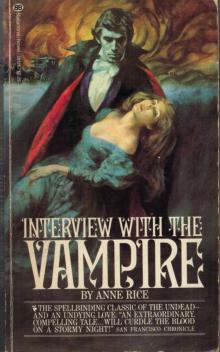 Interview with the Vampire
Interview with the Vampire Christ the Lord: Out of Egypt
Christ the Lord: Out of Egypt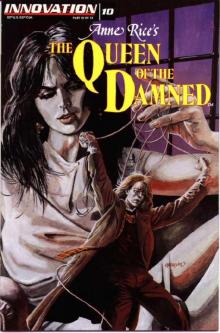 The Queen Of The Damned
The Queen Of The Damned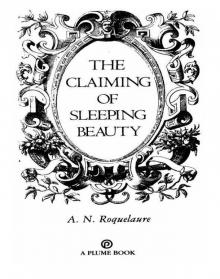 The Claiming of Sleeping Beauty
The Claiming of Sleeping Beauty Prince Lestat
Prince Lestat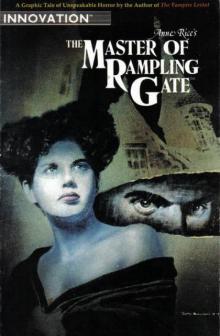 The Master of Rampling Gate
The Master of Rampling Gate The Vampire Lestat
The Vampire Lestat Blood Canticle
Blood Canticle Beauty's Release
Beauty's Release Pandora
Pandora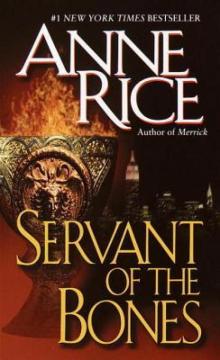 Servant of the Bones
Servant of the Bones Of Love and Evil
Of Love and Evil Beauty's Punishment
Beauty's Punishment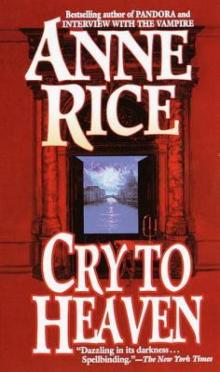 Cry to Heaven
Cry to Heaven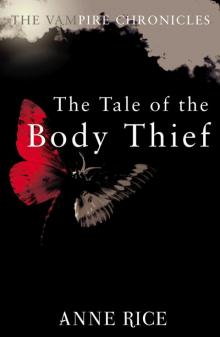 The Tale of the Body Thief
The Tale of the Body Thief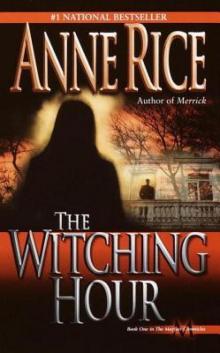 The Witching Hour
The Witching Hour Memnoch the Devil
Memnoch the Devil Blackwood Farm
Blackwood Farm Beauty's Kingdom
Beauty's Kingdom Belinda
Belinda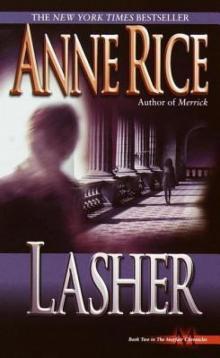 Lasher
Lasher Vittorio, the Vampire
Vittorio, the Vampire Angel Time
Angel Time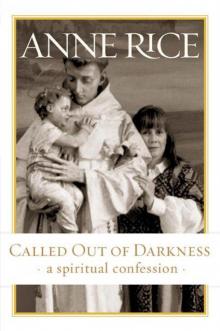 Called Out of Darkness: A Spiritual Confession
Called Out of Darkness: A Spiritual Confession Blood And Gold
Blood And Gold The Passion of Cleopatra
The Passion of Cleopatra Taltos
Taltos Exit to Eden
Exit to Eden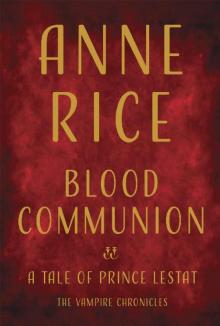 Blood Communion (The Vampire Chronicles #13)
Blood Communion (The Vampire Chronicles #13) The Wolf Gift
The Wolf Gift The Wolves of Midwinter
The Wolves of Midwinter Prince Lestat and the Realms of Atlantis
Prince Lestat and the Realms of Atlantis The Ultimate Undead
The Ultimate Undead The Vampire Lestat tvc-2
The Vampire Lestat tvc-2 The Road to Cana
The Road to Cana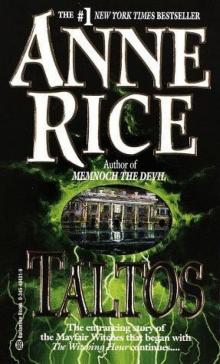 Taltos lotmw-3
Taltos lotmw-3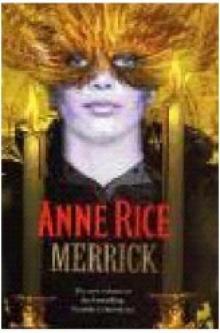 Merrick tvc-7
Merrick tvc-7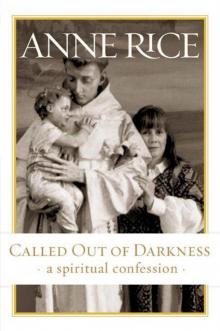 Called Out of Darkness
Called Out of Darkness Pandora - New Vampires 01
Pandora - New Vampires 01 Bllod and Gold
Bllod and Gold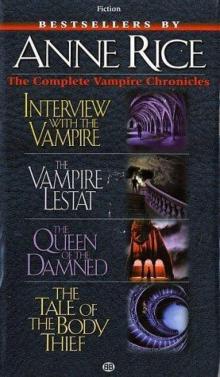 The Queen Of the Damned: Vampire Chronicles
The Queen Of the Damned: Vampire Chronicles The Sleeping Beauty Trilogy
The Sleeping Beauty Trilogy The Claiming of Sleeping Beauty b-1
The Claiming of Sleeping Beauty b-1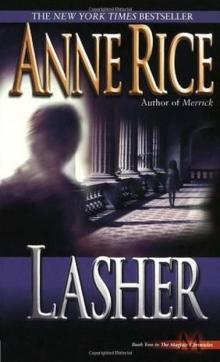 Lasher lotmw-2
Lasher lotmw-2 The Tale of the Body Thief tvc-4
The Tale of the Body Thief tvc-4 The Vampire Chronicles Collection
The Vampire Chronicles Collection Ramses the Damned
Ramses the Damned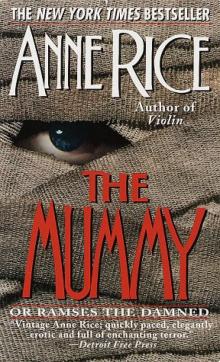 The Mummy - or Ramses the Damned
The Mummy - or Ramses the Damned Vittorio, The Vampire - New Vampires 02
Vittorio, The Vampire - New Vampires 02 The Vampire Armand tvc-6
The Vampire Armand tvc-6 Queen of the Damned tvc-3
Queen of the Damned tvc-3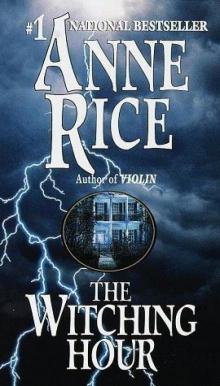 The witching hour lotmw-1
The witching hour lotmw-1 Feast of All Saints
Feast of All Saints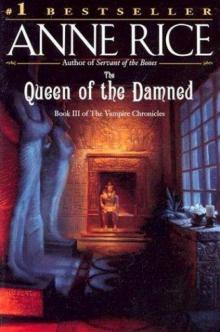 Queen of the Damned
Queen of the Damned The Wolves of Midwinter twgc-2
The Wolves of Midwinter twgc-2 The Mummy
The Mummy Blood and Gold tvc-8
Blood and Gold tvc-8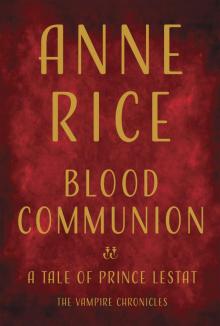 Blood Communion
Blood Communion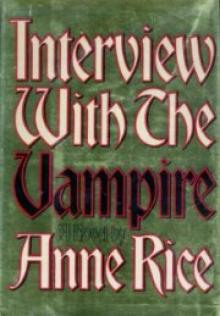 Interview with the Vampire tvc-1
Interview with the Vampire tvc-1 Prince Lestat: The Vampire Chronicles
Prince Lestat: The Vampire Chronicles